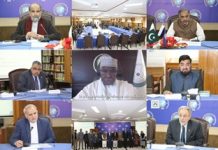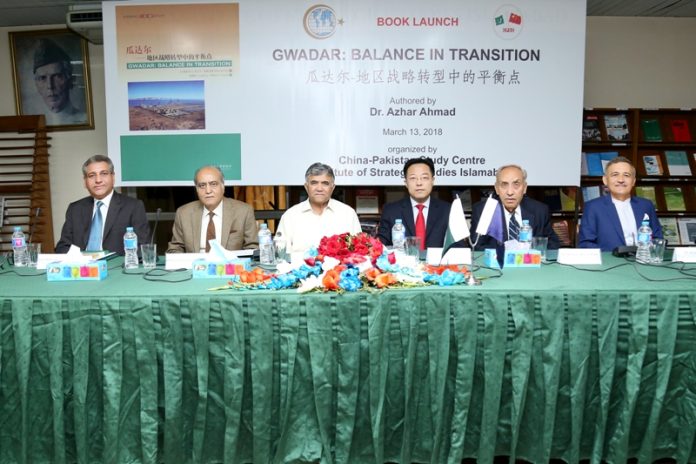Press Release
Book Launch of “Gwadar: Balance in Transition”
March 13, 2018
“Chahbhar and Gwadar will complement each other in times to come, and if Pakistan plays its cards in its own interest, the China-Pakistan Economic Corridor (CPEC) will prove to be a game changer, in real terms.” This was stated by the Former Chief of Naval Staff, Admiral Asif Sandila, who was the Chief Guest at the launch of the book, “Gwadar: Balance in Transition” by Dr. Azhar Ahmad. The event was organized today by the China-Pakistan Study Centre (CPSC) at the Institute of Strategic Studies Islamabad (ISSI).
The book, “Gwadar: Balance in Transition” is an in-depth study of the multi-dimensional aspects of Gwadar and contextualizes the evolving dynamics of the maritime affairs in the region. The distinguished commentators at the book launch included: Rear Admiral Farrokh Ahmed HI (M), Deputy Chief of Naval Staff (Projects), Naval Headquarters, Islamabad; Dr. Pervaiz Iqbal Cheema, Dean, Faculty of Contemporary Studies, National Defense University (NDU), Islamabad; Mr. Zhao Lijian, Deputy Chief of Mission at the Embassy of the People’s Republic of China in Islamabad; and the author of the book Dr. Azhar Ahmed, Head of Department, Humanities and Social Sciences, Bahria University, Islamabad.
Earlier in his welcome remarks, Chairman ISSI, Ambassador Khalid Mahmood introduced the author and lauded his scholarly efforts to contribute to the existing literature on Pakistan’s maritime sector, especially the neglected importance of Gwadar. Ambassador Khalid Mahmood, while briefly dwelling on the history of the port, stated that Gwadar is the key to future development of Pakistan. Although, the Chairman said, Gwadar is being built primarily for trade and commerce, it also has strategic importance. Talking about sisterhood of Chabahar and Gwadar, he emphasized that mere declaration is not going to be enough.
Rear Admiral Farrokh Ahmed was the first reviewer of the book. Pressing on the need to evolve Pakistan’s maritime strategy in the transforming regional and global scenarios, he praised the book as profound research. He commented that given the author’s expertise on maritime affairs, the present publication helps understand the intricate dynamics of the maritime arena. Admiral Farrokh Ahmed emphasized on the need to capitalize on the abundant maritime resources which Pakistan has been blessed with.
Shedding light on the conceptual framework of the book, Dr. Pervaiz Iqbal Cheema appreciated the author’s diligence and perceptive analyses presented in the book. He remarked that the author actually highlighted the importance of maritime affairs, while discussing the elements of powers. Dr. Azhar, he observed, underscored the ignored elements of power and this is where the book becomes highly useful. Referring to the operational affairs of the Gwadar port, he said that Chinese have been our tested friends and they never let us down, whereas other friends abandoned us many a time.
Mr. Zhao Lijian congratulated the author on his seminal publication. He called it a thorough study and lauded the efforts by the author to present a comprehensive background of Gwadar’s history and a meticulous analysis of its present. He said that the book is significant for both the governments in terms of policy making. Mr. Lijian gave a detailed account of current state of development of the Chinese projects in Gwadar. He said that all these projects are for the welfare of the people of Baluchistan, which include: New Gwadar International Port; Upgradation of schools and hospitals in Gwadar through Chinese grant; Gwadar Smart Port City; Eastbay Expressway; and power plants. Many of these projects are being implemented under Chinese foreign aid and grant system, which will ultimately benefit the people of Baluchistan.
Concluding the launch, Ambassador Khalid Mahmood, Chairman ISSI commended the author for making a valuable all-encompassing contribution to understanding Gwadar and its maritime significance in the geo-economic calculus of Pakistan.












